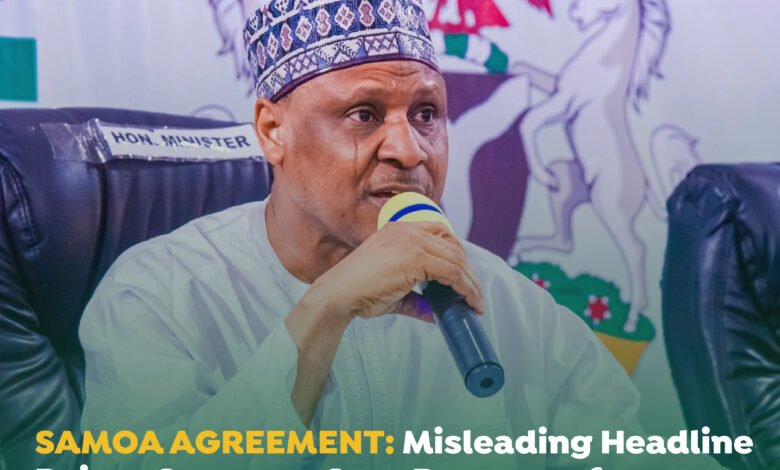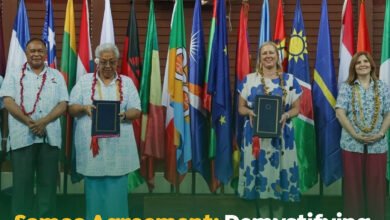SAMOA AGREEMENT: Misleading Headline Raises Concerns Over Dangers of Sensational Reporting

Nigeria’s signing of the Samoa Deal was supposed to be a positive step for the country. But it did the opposite. A misleading headline by a national newspaper sparked outrage and condemnation, rupturing the media landscape.
A July 4th, 2024 headline in the Daily Trust: “LGBTQ: Nigeria signs a $150 billion Samoa deal.” This catchy but fabricated claim ignited an Armageddon-like reaction. Conspiracy theories around the deal spread like wildfire while opposition members used it to score cheap political points.
In the words of one analyst, it was a fire that ought not to start in the first place.
Surprisingly, a thorough and careful reading of the 12-page document shows that the catchy headline was far from the document’s content, underscoring the effect of misinforming the public with falsehood. Unfortunately, the deed of profiting from deliberate chaos between the government and the people had already been done.
‘Profiting from chaos, daily’
When the minister of Budget and economic planning, Alhaji Atiku Bagudu, signed the Samoa agreement on June 28, 2024, he had no idea the media coverage and reportage of his official duty would translate to a high-decibel slanging match among Nigerians.
The Daily Trust’s misleading report exposed the dangers of “lazy, click-bait, and sensational reporting” in a country facing social and economic challenges. Analysts argue it also highlights a lack of media literacy among the public.
“What the Daily Trust has done with that single story is a demonstration of the power of the media in agenda setting, manipulating conversation and distorting reality,” Adamu Bashir noted, “but once they are back in the newsroom and the reality is dawn on them, they will see the danger of what they have done not just to their brand but to the psyche of millions of Nigerians who rely on them for accurate and factual information.”
“They’ve let Nigerians down by distorting facts of the agreement,” Jide Samuel contended, “by reporting the views of some individuals over the controversial deal as facts lifted from the document simply to confuse unsuspecting members of the public with their own clandestine and surreptitious motives in mind means the government must scape-goat Daily Trust as a deterrence.” He added that lots of young Nigerians quickly believed the headline without reading the content hook, line, and sinker. He said the country must embark on a mass literacy and comprehension exercise for Nigerians; otherwise, a more sensational and click-bait news report will set the country on an unquenchable explosion and social unrest.
Samoa Agreement: Separating Facts From Fiction
The 12-page agreement entitled “The Samoa Agreement with African, Caribbean, and Pacific States” is probably one of the most contentious documents in recent times. Analysts contend that as at November 2023, 30 of the OACPS members, especially African and Caribbean, had failed to append their signatures to the document with explanations ranging from whether the conditions in the agreement would be in accordance with their legal order, particularly as it relates to same-sex relations and sexual health and rights but that has since changed.
“Anyone who takes the trouble to read the 12-page agreement would know that our lazy, stenographic news ecosystem has merely created a storm in a teacup”, Professor Farooq Kperogi enthused in his weekly column Notes From Atlanta.
Expectedly, the Nigerian government has since presented the public with the facts as it clarified that the Samoa Deal does not infringe on national sovereignty or address LGBTQ rights.
Unfortunately, the initial misinformation by Daily Trust has sown distrust.
This latest development again underscores the importance of media literacy.
Communication experts suggest that educational initiatives can help Nigerians critically evaluate information and identify bias.
They however contend media outlets themselves also have a responsibility to fact-check information and avoid sensational headlines.
“Media organizations should prioritize accuracy and hold themselves accountable for ethical reporting.” veteran journalist Seun Akindele advised.





